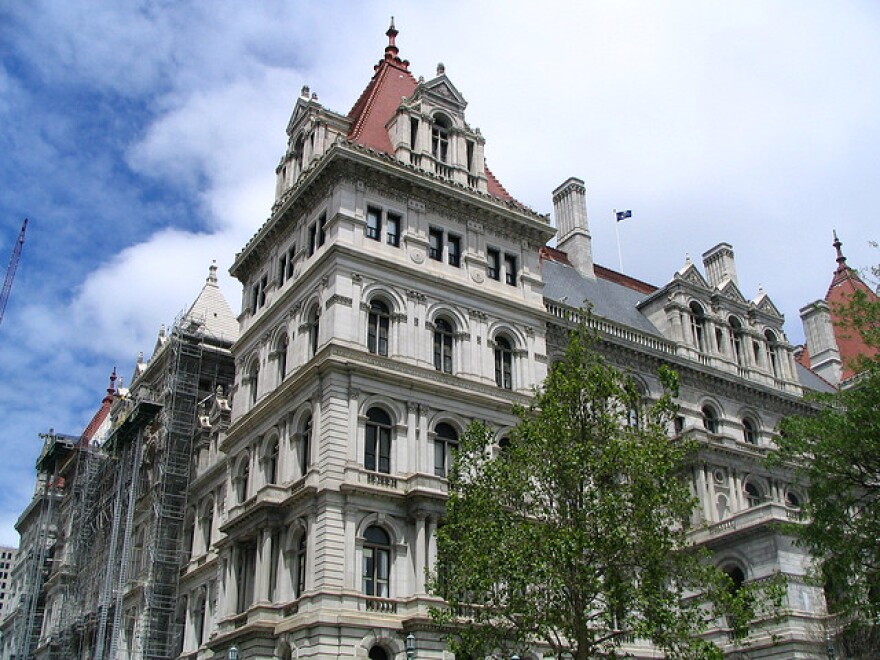The state Assembly narrowly approved a measure to remove the religious exemption for vaccinations in the wake of a severe measles outbreak that began in communities with a high percentage of unvaccinated children in New York and is steadily spreading to other states.
The measure almost didn't make it out of the health committee, and the chair of that committee voted against the bill on the Assembly floor.
The weeks-long logjam over the bill in the Assembly broke when the health committee approved the bill, 13-12, after a majority of the 100 Democratic Assembly members agreed in a private party conference meeting that the measure deserved an airing on the floor.
Health committee chair Richard Gottfried voted yes in the committee vote. He said some of the members who were also voting to advance the bill did not necessarily back it.
"I believe that it is my responsibility as chair to help carry out the will of the (Assembly) majority conference," Gottfried said.
Gottfried voted against the bill on the Assembly floor, saying he does not believe the measles outbreak warrants approving a bill that he said interferes with the First Amendment and freedom of religion. He believes public health efforts should be strengthened instead.
Other prominent Assembly Democrats also voted against the measure, including codes committee chair Joseph Lentol, who also cited religious liberty.
And many Republicans voted no, saying only a very small percentage of those who are unvaccinated have claimed a religious exemption. Assemblyman Andrew Goodell, a Republican from Jamestown, said the real problem is that most unvaccinated people simply have not complied with existing requirements.
"In the vast majority of our state, those religious exemptions do not affect the herd immunity levels and only interfere with a person's genuinely held religious belief," said Goodell, who added he is not opposed to vaccinations.
In the debate, sponsor Jeffrey Dinowitz said scientific evidence and all the major medical organizations say vaccines are necessary and save lives. He said those who use the religious exemption to avoid vaccines jeopardize the lives of children with compromised immune systems who can't be vaccinated.
"The health of other people, I hate to use this word, trumps people's right to say that they don't want to get vaccinated or have their children vaccinated," Dinowitz said.
Assemblyman Ken Zebrowski -- a Democrat from Rockland County, one of the epicenters of the disease -- urged his colleagues to overcome any doubts they may have and vote yes.
"I know it's a difficult vote. I know there's a lot of people in this building who are very passionate, and I honestly respect their passion," Zebrowski said. "But we have to protect public health, colleagues."
The measure squeaked by, 77-53, just one vote more than needed to approve a measure in the 150-member Assembly.
The chamber erupted as groups opposed to vaccinations, including some evangelical Christians and orthodox Jewish members, shouted and screamed insults, and in some cases, vulgarities, from the gallery.
Outside the chamber, Kathryn Kaye of Seaport, Long Island, tearfully witnessed the proceedings.
"The people of New York don't realize that it's not just the students that they are coming after," Kaye said. "Everybody is losing their right to say 'no' to what's injected into their body."
Dinowitz said no one will be required to be vaccinated, and he said New Yorkers can still get a medical exemption.
"Nobody can be physically forced to vaccinate their children, it does not do that," Dinowitz said.
He added it's important to protect "vulnerable children" who can't be vaccinated.
"It's just shocking to me that so many people are willing to overlook those kids," he said.
Unvaccinated children without a medical exemption would be barred from schools and day care centers.
The state Senate also approved the bill, and Gov. Andrew Cuomo signed it.
Cuomo said earlier that while he respects the freedom of religion, he believes those concerns are "overwhelmed by the public health risk."








